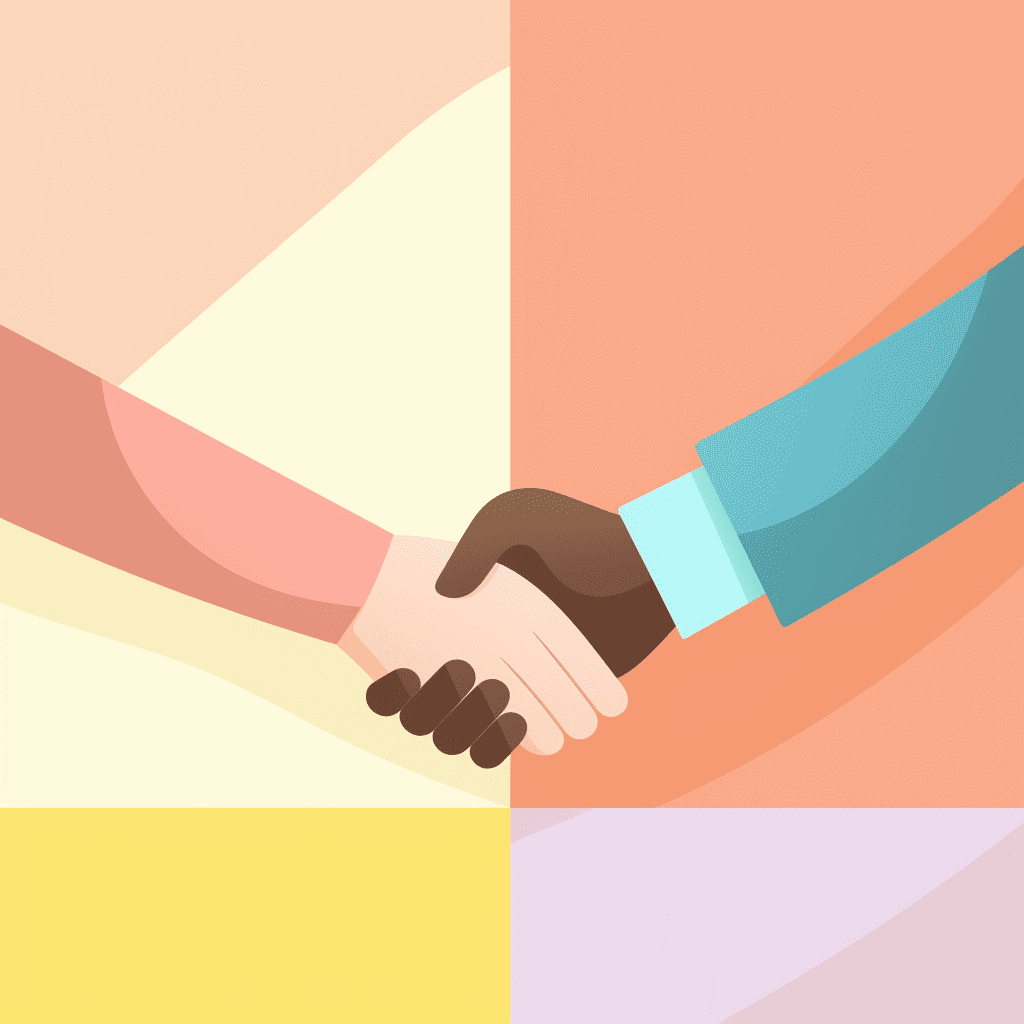Have you ever traveled to a different country and found yourself lost or fascinated by the differences in how people are expected to act? These differences are called social norms.
These norms vary widely from one part of the world to another, giving each culture its unique flavor and identity. But what exactly are social norms, and how do they shape societies?
Social Norms are unwritten rules that govern how individuals act, respond, and interact within their communities. Here are some examples:
- Shaking hands
- Tipping
- Holding the door open
- Waiting in line
- Standing when an older person enters
Social norms serve as guideposts, helping people navigate their daily lives within the context of their community. These norms can relate to anything from how to greet someone and what to wear, to deeper issues like gender roles and religious practices, or returning what we have been given.
Understanding these norms not only helps us appreciate the diversity of human experience but also fosters greater cultural awareness and empathy.
In this article, we've compiled an extensive list of over 150 social norms from various cultures around the world. These norms offer a window into the values, beliefs, and practices that define these communities.
Norms and Tourism
Traveling is super fun and helps us learn a lot about the world. But when we go to new places, we enter a world with new rules and ways of doing things. It's important to respect these to make the trip better for everyone. Here are some easy-to-follow tips:
Do Some Research
Before you go somewhere new, look up what people there normally do and don't do. You can use the internet or read travel books to find out more.
Dress the Right Way
Some places have rules about what you can wear, especially at religious spots. For example, in some countries, women need to cover their hair with a scarf. Make sure you know these rules before you go.
Learn Simple Local Words
You don't have to speak the language perfectly, but learning a few words like "hello" and "thank you" can make people really happy and show that you care. Apps like DuoLingo and Rosetta Stone offer quick and easy language learning tools.
Be Careful When Taking Photos
In some places, taking pictures of people or certain places without asking can be seen as rude. Always ask if it's okay before you take a photo.
Eating the Right Way
Different countries have different rules for eating. For example, in Japan, there's a correct way to use chopsticks. Try to learn these rules before you eat with locals.
Join In but Don't Overdo It
People usually like it when visitors join in their traditions. But make sure you're not doing too much or doing it the wrong way. Always ask if you're not sure.
Small Gifts are Nice
In some places, like Japan, people give small gifts when they visit someone's home. If you're invited over by someone, a small gift from your own country is a nice way to say thank you.
Be Respectful to Special Places and Things
Some places have very old buildings or religious things. Always treat these with respect. Never touch or damage them.
Laws are Important
In some places, not following local rules can get you in trouble with the law. For example, in Singapore, throwing trash on the ground can result in a fine.
Be Ready to Adapt
Sometimes you might not know what to do. In such cases, it's a good idea to watch what the local people are doing and do the same.
By following these tips, you show respect for the places you visit. Plus, you make your own trip much more fun and interesting.
Common Social Norms Across Cultures
1. Saying "Please" and "Thank You"
It's considered polite to say "please" when asking for something and "thank you" when receiving something.
2. Shaking Hands
This is a common way to greet people in many Western countries.

3. Making Eye Contact
When talking to someone, making eye contact usually shows you're paying attention.
4. Covering Mouth When Coughing or Sneezing
It's polite and hygienic to cover your mouth with your elbow when you cough or sneeze.
5. Waiting in Line
People are expected to wait their turn in line without cutting ahead.
United States Norms
6. Tipping in Restaurants
In the United States, it's normal to leave a tip of 15-20% for good service.
7. Taking Off Shoes in Some Homes
Some families prefer guests to remove their shoes before entering the home.
8. Holding the Door Open
It's common to hold the door open for the person coming in behind you.
9. Saying "Bless You" After a Sneeze
It's customary to say this as a polite gesture.
10. Not Talking About Religion or Politics at the Dinner Table
These topics are often avoided to keep the conversation light.
Japanese Norms
11. Bowing
In Japan, people bow to each other to show respect.
12. Removing Shoes Before Entering a Home
This is a must in many Japanese homes.
13. Slurping Noodles
Contrary to Western norms, slurping noodles is considered polite and indicates that the food is delicious.
14. Not Tipping
Tipping is often considered rude in Japan.
15. Using Both Hands When Giving or Receiving an Item
This shows respect and attentiveness.
16. Using “San” After Names
Adding the suffix “San” after someone’s name is a polite form of address.
17. Silence is Golden
Quietness is valued in public spaces like trains and restaurants.
Indian Norms
18. Namaste as a Greeting
Folding your hands and saying "Namaste" is a common greeting.
19. Eating With Hands
In many parts of India, eating with your hands is normal and even encouraged.
20. Avoiding Beef
Due to Hindu religious beliefs, beef is generally avoided.
21. Wearing Modest Clothing
Especially for women, wearing revealing clothing is often frowned upon.
22. Arranged Marriages
Arranged marriages are still prevalent and socially accepted.
French Norms
23. Cheek Kissing as a Greeting
In France, it's common to greet people with a kiss on both cheeks.
24. Not Rushing Through Meals
Meals are often long, social events.
25. Not Speaking Loudly in Public
Speaking loudly is often seen as disruptive.
26. Drinking Wine During Meals
Wine is often considered a staple during lunch and dinner.
27. Using "Monsieur" or "Madame"
Formal titles are important in social and business settings.
28. Bread at Every Meal
Bread is commonly served with most meals.
29. Fashion Sense
Dressing well is considered important in many social situations.
30. Being Direct
French people often appreciate directness and candor in conversation.

South African Norms
31. Ubuntu Philosophy
The idea that "I am because we are" is prevalent in South Africa.
32. Braai (BBQ)
Social gatherings around a grill are common and encouraged.
33. Using Local Languages for Greetings
"Hello" in Zulu is "Sawubona" and in Afrikaans, it's "Hallo".
34. Being Punctual
Being on time is considered respectful.
35 Respecting Elders
It’s considered very important to show respect to older individuals.
36. Being Called by Your First Name
First-name usage is often acceptable even in professional settings.
37. Community Events
Participation in local community events, such as festivals, is common.
British Norms
38. Queuing
British people are known for forming orderly queues and waiting their turn.
39. Afternoon Tea
Taking time in the afternoon for tea and snacks is a cherished tradition.
40. Avoiding Small Talk With Strangers
It's generally not customary to engage in small talk with strangers, especially on public transportation.
41. Punctuality
Being on time is highly valued.
42. Using “Sir” or “Madam”
Using these formal titles is considered polite in various social settings.
Chinese Norms
43. Giving and Receiving Business Cards with Both Hands
This is a sign of respect.
44. Not Sticking Chopsticks Upright into a Bowl of Rice
This resembles a funeral ritual and is considered disrespectful.
45. Red as a Lucky Color
Red is often used in festivals, weddings, and other celebratory events.
46. Avoiding the Number 4
The number 4 is avoided as it sounds like the word for "death" in Chinese.
47. Avoiding Public Displays of Affection
It's rare to see public displays of affection, like hugging and kissing.
Brazilian Norms
48. Cheek Kissing as a Greeting
One or two cheek kisses are common when greeting someone.
49. Sharing Food
Sharing food from a communal dish is often seen at social gatherings.
50. Being Expressive
Brazilians are known for their expressive body language.
51. Being Late is Acceptable
Being a bit late is often considered normal and acceptable.
52. Soccer as a Social Activity
Watching or playing soccer is a popular social activity.
Australian Norms
53. Casual Greetings
Using "G’day" or "How ya goin’?" are popular ways to greet someone informally.
54. Bringing a "Plate"
When invited to someone's home, it's often expected that you'll bring a dish to share.
55. Respect for Nature
Australians value their natural surroundings and often engage in outdoor activities.
56. Mateship
Friendship and solidarity are important cultural values.
57. No Tipping
Tipping isn't generally expected in restaurants or bars.
German Norms
58. Punctuality
Being on time is considered very important in Germany.
59. Formal Titles
Using “Herr” for Mr. and “Frau” for Mrs. is common and considered polite.
60. Not Jaywalking
People wait for the green pedestrian light, even if no cars are coming.
61. Separating Trash
Recycling is taken seriously, and people are expected to separate their waste.
62. Shaking Hands
A firm handshake is a common greeting and seen as a sign of respect.
Russian Norms
63. Not Smiling at Strangers
Smiling without a reason can be viewed as insincere.
64. Bringing a Gift When Visiting Someone’s Home
It’s considered polite to bring a small gift or flowers.
65. Toasting Before Drinking
Offering a toast before drinking, especially vodka, is a common ritual.
66. Not Whistling Indoors
Whistling inside a building is considered bad luck.
67. Sitting Down Before a Journey
It's a tradition to sit for a moment in silence before embarking on a journey.

Italian Norms
68. Kissing on Both Cheeks
A light peck on both cheeks is a common greeting.
69. Gesturing While Talking
Italians are known for using hand gestures to emphasize points.
70. Dressing Well
Appearance and fashion are considered important.
71. Serving Coffee After Meals
Coffee, especially espresso, is often served after meals but rarely during.
72. Never Serve Cappuccino During Dinner
Cappuccino is considered a breakfast drink.
Mexican Norms
73. Late Arrivals
Being a little late is generally accepted in social settings.
74. Using Formal Titles
Using “Señor” or “Señora” is considered respectful.
75. Offering Food to Guests
It's common to offer food to guests, even if it's not mealtime.
76 Avoiding Conflict in Conversation
Direct confrontation or disagreement is often avoided in conversation.
77. Family is Paramount
Family values are deeply ingrained in the culture.
Canadian Norms
78. Saying "Sorry" Often
Canadians are known for being polite and saying "sorry" even when it might not be necessary.
79. Holding the Door
Like in the United States, it's common to hold the door for others.
80. Regional Language Differences
In Quebec, speaking French is the norm.
81. Ice Hockey Etiquette
Cheering for the local ice hockey team is a popular social activity.
82. Removing Shoes When Entering a Home
Many Canadians prefer guests to take off their shoes.
Spanish Norms
83. Late-night Socializing
It’s common for social gatherings and dinners to extend into late hours.
84. Siestas
Afternoon rests or naps are culturally accepted.
85. Two Kisses as a Greeting
A kiss on each cheek is standard when greeting someone.
86. Speaking Loudly
Compared to other European countries, talking at a higher volume is more socially accepted.
87. Tapas Culture
Sharing small dishes, or tapas, is a common way to enjoy a meal.
Nigerian Norms
88. Respect for Elders
Older people are treated with a great deal of respect, including using specific greetings for elders in tribal languages.
89. Sharing Food
When you have food, it's customary to offer it to others around you.
90. Avoiding Left Hand for Gestures
The left hand is considered unclean, so avoid using it to make gestures or to eat.
91. Religion in Daily Life
Religious practices and references are incorporated into daily life and conversations.
92. Dressing for Occasions
Special events call for colorful and elaborate traditional attire.
Saudi Arabian Norms
93. Gender Segregation
In many public spaces, men and women are separated.
94. Dress Codes for Women
Women are expected to wear an abaya, a loose-fitting black cloak.
95. Avoiding Pork and Alcohol
These items are prohibited due to Islamic law.
96. Frequent Prayer
Muslim residents pause for prayer five times a day, and many businesses close during these times.
97. Use of Titles
Using a person’s full title is considered a sign of respect.
Swedish Norms
98. Fika Break
A coffee and socializing break known as "fika" is common in workplaces and social settings.
99. Personal Space
Maintaining a comfortable distance during conversations is important.
100. Taking Off Shoes Indoors
Like in many other countries, it’s customary to remove shoes when entering someone’s home.
101. Gender Equality
Gender-neutral language and roles are highly encouraged.
102. Recycling
Swedes take recycling seriously, even separating food waste for composting.
South Korean Norms
103. Bowing
A slight bow is a common form of greeting.
104. Using Both Hands
Offering or receiving something with both hands shows respect.
105. Avoiding Eye Contact with Elders
Direct eye contact with someone older can be seen as disrespectful.
106. Not Writing Names in Red Ink
Writing someone's name in red ink is considered bad luck or symbolic of death.
107. Spicy Food
The love for spicy food, especially kimchi, is a shared cultural norm.
Filipino Norms
108. "Mano Po" as a Greeting
Touching the hand to the forehead is a traditional way to greet elders.
109. Karaoke as a Social Activity
Karaoke is often part of social gatherings and celebrations.
110. Community Support ("Bayanihan")
Helping each other in the community, especially during events like moving houses, is encouraged.
111. Eating with Hands ("Kamayan")
In some settings, eating with your hands is considered normal.
112. Late-night Social Meals ("Pulutan")
Late-night meals shared with company often accompany social drinking events.

Turkish Norms
113. Offering Tea or Coffee
Offering tea or Turkish coffee to guests is a sign of hospitality.
114. Kissing on Both Cheeks
A kiss on each cheek is a common greeting, especially among close friends and family.
115. Taking Off Shoes
Removing shoes when entering someone’s home is customary.
116. Using "Abla" or "Ağabey" for Strangers
These terms mean "sister" and "brother" and are used for strangers to show respect.
117. Breakfast as a Family Event
Breakfast is often an elaborate family affair, especially on weekends.
Argentine Norms
118. Late Dinners
Dinner often starts late, sometimes around 9 PM or even later.
119. Mate Tea Sharing
Sharing this traditional tea from a communal gourd is a social activity.
120. Speaking Loudly and With Gestures
Expressive body language and a louder volume are common in conversation.
121. Argentine Tango
This dance form is not just popular but also a significant aspect of national identity.
122. Football (Soccer) as a Religion
Football is more than just a game; it's a cultural cornerstone.
Egyptian Norms
123. Using "Inshallah"
This term, meaning "God willing," is often used in conversations about future plans.
124. Offering Food to Visitors
It’s a custom to offer food or drink to guests.
125. Male-Female Interactions
Public displays of affection between men and women are usually frowned upon.
126. Respecting Ramadan Rules
During Ramadan, eating, drinking, or smoking in public during daylight is discouraged.
127. Not Using the Sole of Your Foot to Point
The sole of the foot is considered unclean; avoid using it to point at things or people.
Thai Norms
128. Wai Greeting
A greeting involving a slight bow with palms pressed together.
129. Respecting the Royal Family
Criticizing or disrespecting the royal family is a serious offense.
130. Removing Shoes
It’s a common practice to take off shoes when entering someone's home.
131. No Touching of Heads
The head is considered the most sacred part of the body; avoid touching anyone’s head.
132. Eating With a Spoon
Rather than using forks or hands, a spoon is often used as the main eating utensil.
Colombian Norms
133. Dance Culture
Salsa and other forms of dance are integral to social gatherings.
134. Offering Coffee
Offering a cup of coffee is a common social gesture.
135. Using Formal Titles
"Señor" or "Señora" is often used in formal or business settings.
136. Loud Conversations
Talking loudly is generally acceptable, especially in informal settings.
137. Visiting During Holidays
It's customary for people to visit their families in their hometowns during major holidays.
Swiss Norms
138. Punctuality
Being on time is highly valued, both in social and business settings.
139. Recreational Hiking
Hiking is a common social activity and widely considered a part of the national culture.
140. Discreetness
Privacy and discretion are highly valued; people usually avoid sharing personal information in public.
141. Neutrality in Discussions
In line with Switzerland’s political neutrality, people often avoid taking sides in arguments.
142. Waste Sorting
Much like in Germany and Sweden, waste sorting and recycling are taken seriously.
Greek Norms
143. Saying "Opa!" in Celebrations
The exclamation "Opa!" is often used during celebrations and gatherings, especially during dances.
144. Name Day Celebrations
In Greece, celebrating one's name day— the feast day of the saint one is named after— is often considered more important than a birthday.
145. The "Mati" or Evil Eye Symbol
The "Mati" is a blue and white eye-shaped symbol thought to ward off the evil eye. You'll often see this symbol in homes, cars, or worn as jewelry.
146. Fasting During Religious Periods
Fasting from certain foods is commonly practiced during specific periods in the Greek Orthodox Church, such as Lent and Christmas.
147. "Philoxenia" or Love for Strangers
The concept of "Philoxenia" describes a cultural obligation to be hospitable to strangers or guests. It's common for Greeks to offer food, drink, or even lodging to visitors, sometimes going to great lengths to ensure their guest's comfort.
148. Group Dancing at Celebrations
Traditional Greek dances are an important part of social gatherings and celebrations. At events like weddings, festivals, and family gatherings, it's common to see people participating in group dances like the "Sirtaki" or "Kalamatianos."
Kenyan Norms
149. Harambee
A Swahili term meaning "all pull together," often used to describe community self-help events and collective action.
150. "Hodi!" When Entering a Home
In many Kenyan communities, it is customary to shout "Hodi!" which means "May I come in?" when entering someone's home.
151. Wrist Snap Handshake
In Kenya, especially among men, a popular informal form of greeting is the wrist snap handshake, which involves snapping each other's middle finger during a handshake.
152. Nyama Choma Socials
Nyama Choma, or "roasted meat," is more than just a meal; it's a social event. These gatherings often take place on weekends or during special occasions and holidays. Families and friends come together to roast meat, usually goat, beef, or chicken.
153. Offering the Right Hand
In Kenya, as in many other cultures, it is important to give and receive items, including money, with the right hand.
154. Carrying Objects on the Head
Especially in rural areas, it's common to see women carrying heavy loads balanced on their heads. This technique is often used for transporting goods like food, water, or firewood.
Conclusion
We've covered a lot of ground, from what social norms are to how they show up in different places around the world. We also gave you some tips for how to respect these norms when you're traveling.
Knowing about social norms isn't just interesting; it helps us connect with people in a better way. It shows we respect them and their way of life, which is super important, especially when we're guests in someone else's home country.
So the next time you're getting ready to travel or even just curious about how people do things in other places, remember the power of understanding and respecting social norms. It can make your experiences richer, and hey, it's also just the right thing to do!
And if you're interested in how these norms are constructed, you can check out our article about social constructs.
It's essential to note that these are general or stereotypical norms and may not fully represent the diversity within each culture, sub-culture, or individual.
This list is not exhaustive and serves as a brief overview. Many of the norms mentioned may have deeper cultural significance or complexities that are not captured here. It's always best to approach each culture with an open mind and a willingness to understand its unique nuances.
